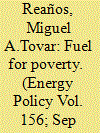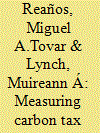| Srl | Item |
| 1 |
ID:
179710


|
|
|
|
|
| Summary/Abstract |
A new approach rooted in economic theory is proposed to analyse the relationship between fuel poverty and income poverty using self-reported data. The model shows that neglecting the overlap between income and fuel poverty underestimates the metrics for the change in income poverty due to increases in carbon taxes. The model is parametrized using econometric methods. Being a single adult with dependent children, having low education levels, low income levels and having darkness or dampness in the dwelling increases the probability of being fuel poor. The estimates show that an 1% increase in carbon taxes will raise the number of people experiencing fuel poverty by 0.5%. It is also shown that while increases in lump-sum transfers are progressive, increases in energy prices and energy required to heat a dwelling are regressive. Among poor households, fuel poor households have the lowest income levels, have issues with dampness, and it is less likely that they have double glazing in their dwellings compared to other income poor households. Income and fuel poverty are two distinctive problems that require different policy instruments. Policies need to address income and energy efficiency inequalities simultaneously to counteract the regressive effect of carbon taxes in Ireland.
|
|
|
|
|
|
|
|
|
|
|
|
|
|
|
|
| 2 |
ID:
177497


|
|
|
|
|
| Summary/Abstract |
A German panel data of vehicle and owner characteristics is used to analyse the incidence of additional carbon taxes. It is shown that an additional carbon tax on fuel used for private transportation is regressive when there is no allocation of tax revenue. When smoothing consumption across time in the face of additional carbon taxes, low income households can reduce the tax burden. When the cost of air pollution is included in the metric for the tax incidence, the tax burden decreases considerably. It is also found that in order to charge drivers for the attributed emissions, carbon taxes need to be set at least at €30 per tonne of CO2 emissions. Moreover, the estimated own price elasticities suggest that an additional carbon tax may fail to induce owners of vehicles with an intense usage to reduce energy consumption. Consequently, carbon taxes need to be designed jointly with other taxes to target heavy polluters.
|
|
|
|
|
|
|
|
|
|
|
|
|
|
|
|
| 3 |
ID:
183057


|
|
|
|
|
| Summary/Abstract |
We quantify the vertical (i.e. between income differences) and horizontal (i.e. within income differences) distributional effects of carbon taxation using a fully flexible demand system and Irish data. The model avoids imposing the curvature of the relationship between income and energy demand. We show that neglecting this fact can lead to misleading policy conclusions. We also show that losses in purchase power are the main channel of welfare losses. Losses due to limitations for energy substitution play a minor role. We found that rural households and householders in retirement age are the most affected by carbon taxation. Regarding horizontal effects, we show that higher heterogeneity in the tax burden is experienced by couples with dependent children and those in urban households. These findings highlight the importance of quantifying both horizontal and vertical distributional effects when designing carbon taxes and revenue recycling mechanisms. Within distributional effects are larger than between distributional effects regarding income inequality of the tax and revenue recycling mechanisms. We found that a targeted transfer is preferred over a lump-sum transfer in reducing welfare losses caused by the regressivity of taxation. These findings hold when measuring both horizontal and vertical distributional effects.
|
|
|
|
|
|
|
|
|
|
|
|
|
|
|
|